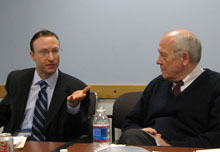Event
WSJ’s Zuckerman: ‘Outliers’ saw what Wall Street experts missed

March 2, 2010 — At a Shorenstein Center Speaker Series event, Greg Zuckerman, senior writer and Heard on the Street columnist at The Wall Street Journal, shared lessons and observations from his book, The Greatest Trade Ever.
Zuckerman presented a paradox that “it should have been the experts who saw this coming — the Wall Street types and insiders,” but it turned out that they missed the “coup of the century,” and instead, a handful of “outliers” got it right. Zuckerman explored the cast of characters that took steps to prepare their firms “to take advantage of the coming difficulty,” such as John Paulson, who invested in credit default swaps and made $20 billion in 2007 and 2008.
While blame for the crisis is often aimed at Wall Street, Zuckerman confronted this notion with the fact that the “biggest losses actually were suffered by Wall Street firms.” Wall Street packaged and sold toxic mortgages to investors, but “they often put them on their own books and believed in them … and they’re the ones who suffered the most, not the least.”
One reason Zuckerman gave for the short-sightedness of Wall Street is that it “pays well,” so people tend to retire early. As a result, there was “no one around who remembered 1992” when a similar crisis emerged, and so history “did not inform their views.”
Another reason Wall Street missed the housing crisis, Zuckerman argued, was that they were so focused on quarter-to-quarter management that few people could step back and think about outlying events that could happen. Zuckerman suggested “hiring people with a longer-term perspective … to think about what could go wrong.”
Zuckerman concluded that investment firms should have “more money set aside in reserves … because you don’t know what the next problem is going to be,” and that “any firm that’s too big to fail shouldn’t be allowed to exist.”
This article was written by Janell Sims and the photos were taken by Leighton Walter Kille, both of the Shorenstein Center.